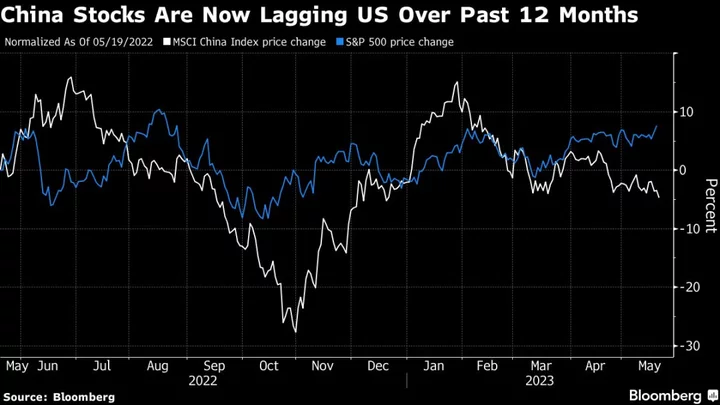Investors in Chinese assets are showing zero tolerance for negative news and setting a high bar for the good.
Patience is in short supply as Beijing sticks to a wait-and-see approach on the economy, taking little notice of calls for more forceful stimulus. While underwhelming growth and corporate earnings may partly explain the deterioration in sentiment, the speed at which bearishness spread across Chinese markets speaks to something more deep-rooted.
The yuan weakened past 7 per dollar for the first time this year, while the MSCI China Index of stocks set a new low for 2023. Even the government-bond rally stalled, with futures halting a seven-week rally.
China is slipping into a “confidence trap” for consumers, businesses and investors, to borrow a term used by Citigroup Inc. economists this week. Anxiety is elevated after three years of heated tensions with the West, President Xi Jinping’s punishing regulatory campaigns and strict Covid-control policies that left a record number of young people unemployed and undermined commerce.
A meaningful policy response looks like the only thing that could provide support for stocks and the yuan at this point — and give companies and consumers long-sought clarity to spend. But such action isn’t imminent, as I wrote in my latest Macro View. Stimulus or not, there’s no quick fix for poor sentiment.
Here’s my roundup of the week’s key developments for China markets:
Burry buys
Michael Burry, the hedge-fund manager played by actor Christian Bale in The Big Short movie, is betting big on two Chinese tech stocks. JD.com Inc. and Alibaba Group Holding Ltd. have become the largest holdings of his Scion Asset Management and now account for 20% of his stock portfolio.
- Michael Burry Doubles Alibaba Stake in Big Bet on China Tech
- Chinese Stocks Make Comeback at Sohn HK Hedge Fund Summit
Youth unemployment
The jobless rate for China’s 16-to-24 year olds has exceeded 20% for the first time since records began. That’s nearly four times the national rate. Youth unemployment will only worsen in the summer when almost 12 million graduates are set to enter the job market.
- China’s Record-High Youth Unemployment Rate Likely to Worsen
Property struggles
Signs of weakness are emerging in the country’s housing market. Price growth slowed to just 0.32% in April, showing more effort is needed to boost demand. Developers have debt worth 12% of gross domestic product at risk of default, Bloomberg Economics estimates.
- China’s Home-Price Growth Slows as Housing Rebound Fizzles
- China Faces Property Debt Defaults Worth 12% of GDP, BE Says
Confidence trap
Economic data for April was disappointing across the board, prompting economists to cut their GDP estimates for the year and spurring calls for more stimulus measures. Waning momentum shows the lack of confidence among businesses and consumers may be more entrenched.
- China’s Waning Economic Recovery Spurs Calls for Stimulus
- Yuan Slides Past Seven in New Warning Sign for China’s Economy
Tech earnings
Big Tech earnings are also pointing to weaker-than-expected domestic consumer spending. For Alibaba, domestic commerce shrank 3% in the March quarter and its cloud division recorded its first-ever decline. Tencent Holdings Ltd. earnings missed estimates and even Baidu Inc.’s better results did little to lift the stock.
- Tencent’s Sales Rebound Though Concerns Persist on China Outlook
- Baidu’s Revenue Beats After China Recovery Fuels Advertising
- Alibaba Breakup Begins With Spinoff of $12 Billion Cloud Arm
No joke
A Chinese comedian lands in hot water after joking about a military slogan created by Xi. Authorities say the performance was harmful to the People’s Liberation Army and fined his talk show about $2 million. Insulting the military was recently made a criminal offence.
- China Fines Talk Show Firm $2 Million After Comic Teases PLA
- Chinese Police Arrest Woman Who Defended Comic’s Military Joke
AI alarm bells
China’s embrace of artificial intelligence for warfare has touched off alarm bells. Efforts by the US and China to outdo each other are sparking concerns of an AI arms race that could ultimately aggravate any conflict between the two countries. Former Google Chief Executive Officer Eric Schmidt said China invests far more in AI for defense than the US does.
- China Military AI Use Raises Alarm for Congress, Ex-Google CEO
... and three things to watch for next week
- Russian Prime Minister Mikhail Mishustin will lead a government delegation to attend a business forum in Shanghai, which has also invited a group of sanctioned tycoons.
- More tech earnings are due. Next up include Kuaishou Technology — TikTok’s closest Chinese rival — as well as Xiaomi Corp. and NetEase Inc.
- A domestic bias among US investors is paying off, with the S&P 500 now faring better than the MSCI China gauge over the past 12 months. American-based funds have remained underweight Chinese equities on average even when the market rallied.
For a deeper dive into where China stands now — and where it’s going next — sign up to the Next China newsletter.

